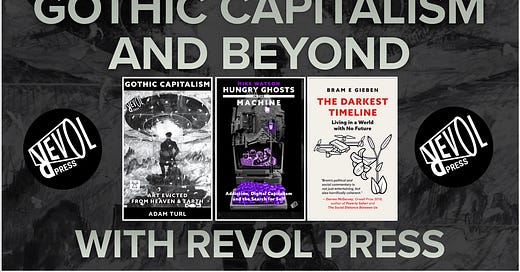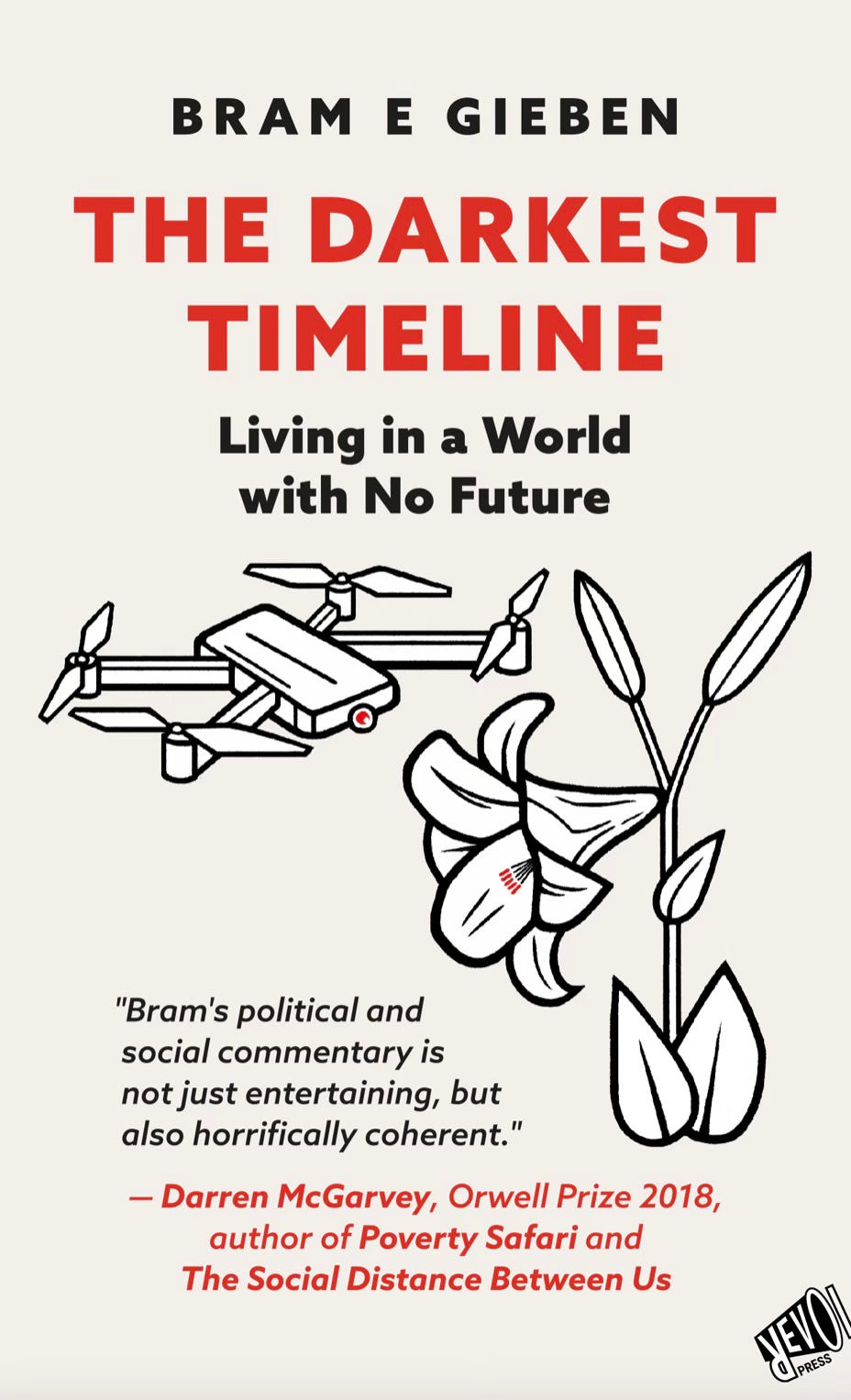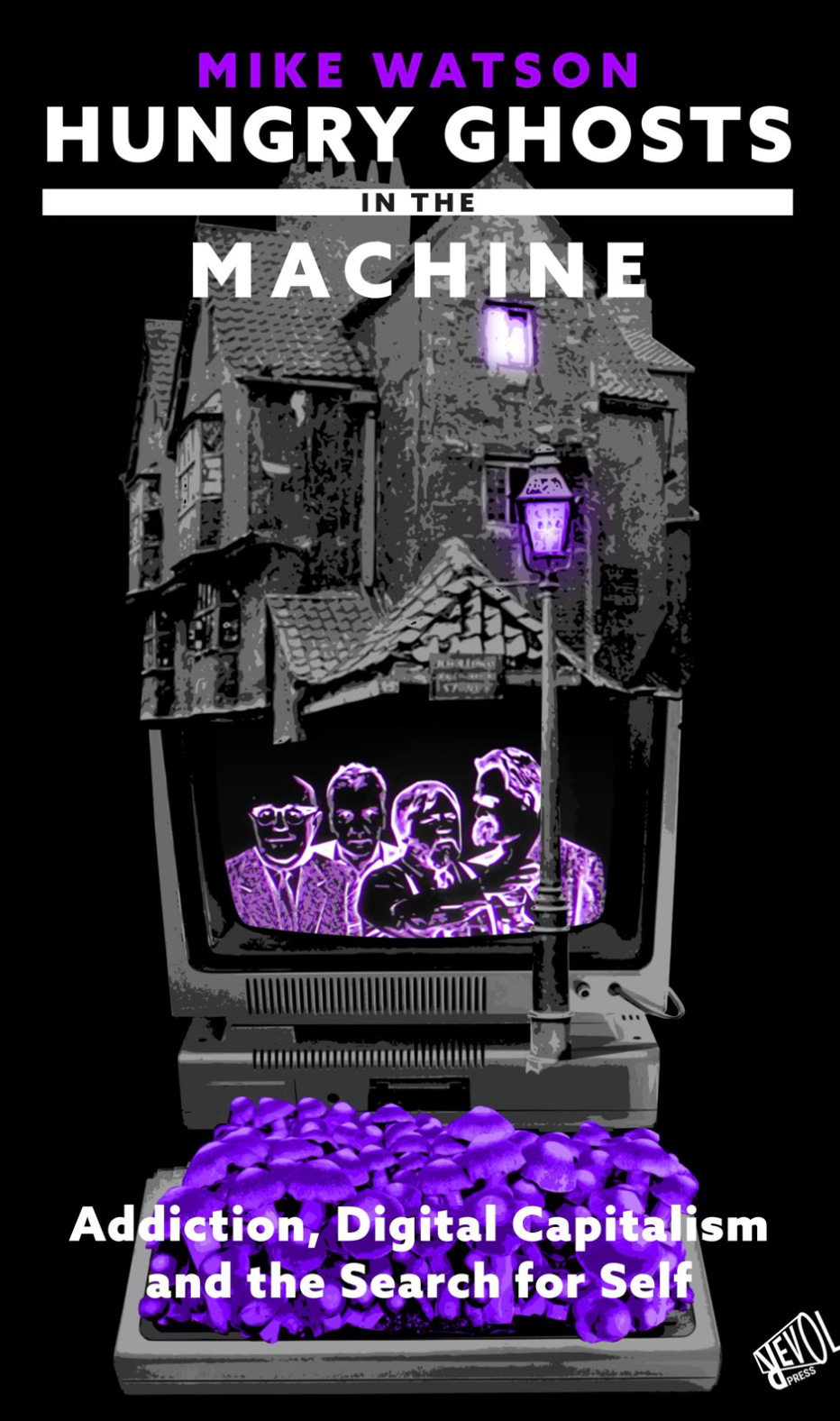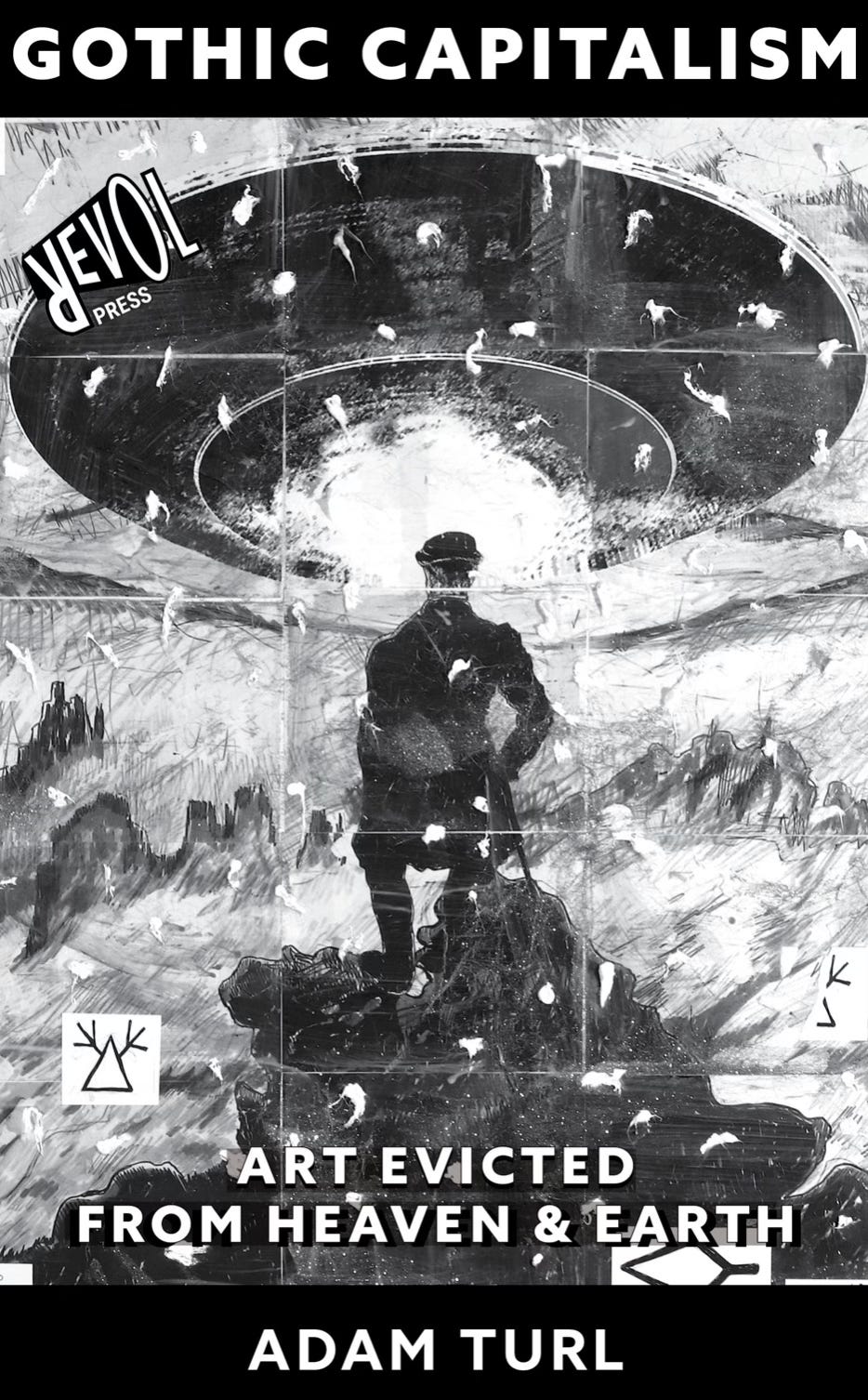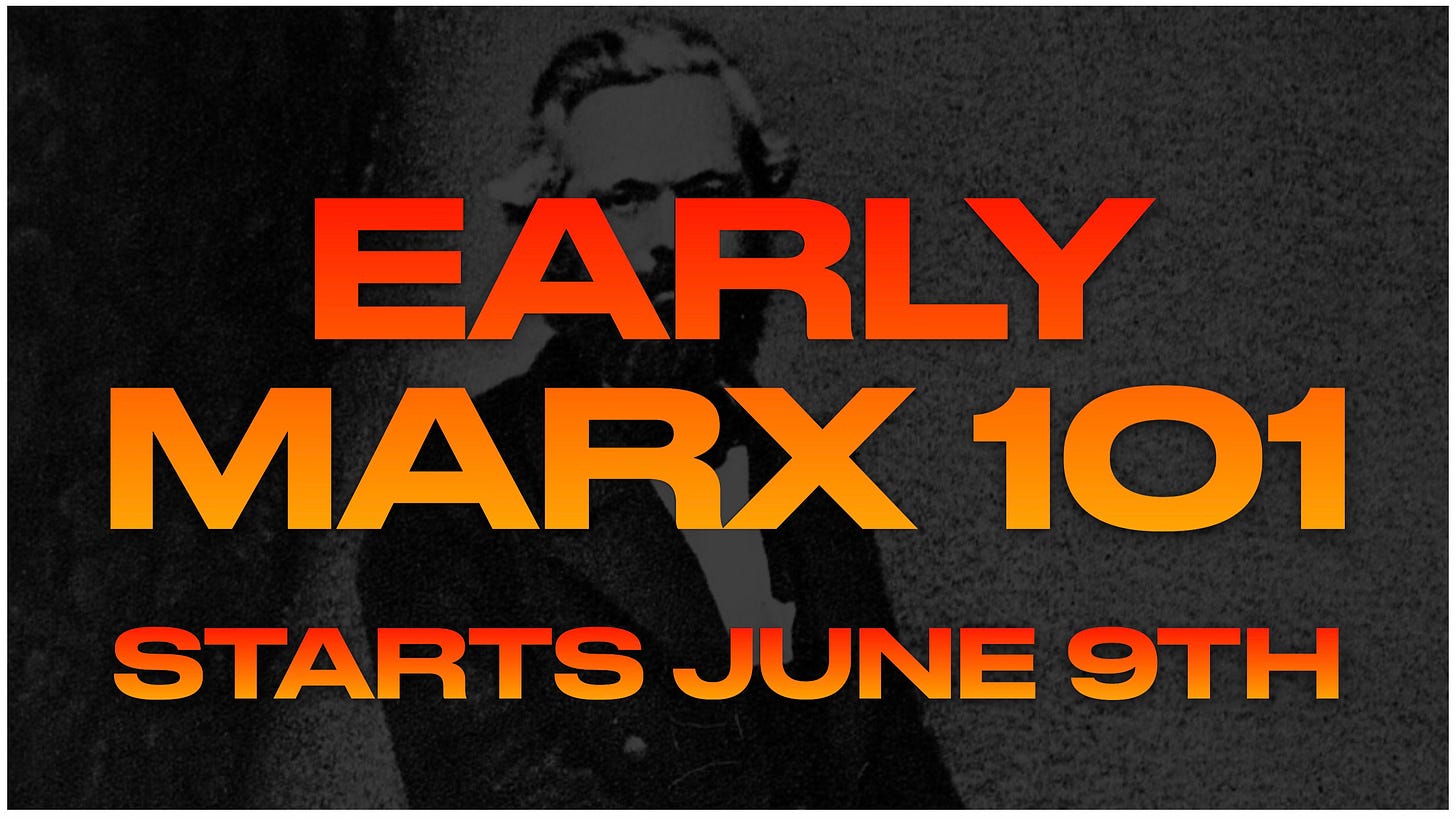This June in The Portal we will be hosting
, including Mike Watson, , and , for a month dedicated to the over-arching theme of “Gothic Capitalism and Beyond”. This month will be informed by the recently published works of Revol Press: Watson’s Hungry Ghosts in the Machine, Gieben’s The Darkest Timeline, and Turl’s Gothic Capitalism. To attend you can sign up through Revol Press or by becoming a member of The Portal:Revol Press is a new author-run and oriented publisher dedicated to reviving countercultural dreaming alongside incisive materialism, emphasising quality over edgy content and hot takes, putting out considered and yet direct reflections in a timely manner. Revol Press also aims to support established writers and discover new talent, prioritising ongoing dialogue, and an emphasis on quality essays and books that promote formal and theoretical innovation.
The Portal is a live event space dedicated to both building philosophical community, as well as helping establish a robust/anti-fragile interdisciplinary theoretical milieu, capable of not only interfacing with the real negativity of difference but also persistently embodying the real positivity of multiplicity. Throughout 2025 we have been working with integral theorists, Marxists, Christian communities, as well as art and literature organisations. This month with Revol Press seeks to bring together philosophy, theory and counter-cultural political thinking to interface with contemporary challenges in Marxist and socialist theory-praxis as it relates to digital capitalism and social apocalypse.
I hosted a discussion with Mike Watson, Bram E. Gieben and Adam Turl to previous our month together:
This month in The Portal is the result of a steady build up of dialogue between myself and Mike Watson, Bram E. Gieben, and Adam Turl. Over the past year Philosophy Portal has been hosting conversations with these three authors regarding their respective works published by Revol Press. In June of 2024 I hosted Bram E. Gieben for a conversation about his latest book The Darkest Timeline, which represents a work of speculative philosophical reasoning and outsider insight, offering a dynamic ride through critical theory, pop culture, and high-concept fiction. The Darkest Timeline is a document of a writer immersed in the technologically-accelerated culture war of the late twentieth and early twenty-first centuries, and its strange artefacts.
Throughout our conversation about the book, Gieben explains to me that this work both presents to us the challenge of our dystopian present (i.e. “no future/apocalypse”), while at the same time challenging us to think about the chance that looking directly at this lack in the future might open for our imagination and speculative reasoning. This is very much similar to the vibe and the method that is actively being explored in my latest work, Real Speculations.1 Gieben often reflects on the idea that the future in its positive sense (high technological capacities, material abundance) is already here but wildly unequal, presenting itself in disturbingly painful and problematic corporate-driven asymmetries, leaving most present humans in total precarity. From this standpoint, he follows philosopher Slavoj Žižek on a point that has also similarly motivated myself: “don’t act, just think”. This axiom is meant to discharge us of the illusion that we must become utopian revolutionary activists in this moment, but rather, we must go back to the metaphorical drawing board, and ask ourselves the most difficult questions. One of the questions that Gieben and I both reflect on is something along the lines of: “do cultures evolve beyond the point of technological singularity?”
In August of 2024 I hosted Mike Watson to discuss his latest book Hungry Ghosts in the Machine, a book which reflects on the ways in which social and other digital media utilise nostalgia to heighten anxiety, depression and alienation then offer fleeting cures that ultimately lead to a cycle of longing and, at most, only temporary satiation. This work aims towards a wellbeing and spiritual practice that is freed of compulsive aspects of social media use that might form a useful role in a wider movement aimed at fostering healthier communities.
Throughout our conversation about the book, Watson centres the idea of the “hungry ghost” as a metaphor pointing towards a “bodiless forms” that have small mouths and pot bellies, which express an emaciated emotional disposition of people constantly looking to fill a hole. Watson emphasises that today we are never quite satisfied, constantly looking for some kind of impossible spiritual nourishment through digital surfaces which never arrives. In this condition we are in danger of living our entire life as if we never really had a body, never really lived into our existence, and instead spent our time trying to fill an impossible hole with satisfactions that are inherently fleeting and temporary. While Watson initially counters this motion with inspiration from Mark Fisher’s “Acid Communism”, which offers experimentations with LSD, eastern mysticism, and a hippie culture blurring class boundaries, he also suggests that the challenges that have come to define our life in digital capitalism require something different/other to this experiment, a topic he explores not only throughout his book, but throughout the Revol Press project as a whole. In this exploration Watson often points to the need to talk about sensitive aspects of our addictive natures, to pay more attention to the role of psychoanalytic practice and theory, and also to cultivate the subjective capacity for art, music and creativity as forms of being that can help us transmute addiction in a higher way.
And only this past April 2025 I hosted Adam Turl to discuss his latest book Gothic Capitalism, which provides our month in The Portal with its overall theme. Gothic Capitalism emphasises the role of art in possessing a dual-function, social and spiritual, that is threatened by the economies and ideologies of the art world, the broader culture, and a faltering neoliberal patronage. Turl suggests that art faces a “crisis of substitutability” in being replaced by digital social media and artificial intelligence,2 which needs a literal rapproachement with the Marxist subject (working class) and an irrealist artistic strategy.
Throughout our conversation about the book, Turl emphasises the idea of “Gothic Capitalism” as one that points towards (1) a radically uneven economic development, and (2) a stalled teleology of progress, contrasting with linear models of development driven by industrial production and democracy towards a global bourgeois society. For Turl, we need to think more deeply about temporal distortion, where archaic and modern forms co-exist side by side, where democratic self-activity of workers never pans out, and where capitalism always finds a new way to re-assert its hegemony. In this way, Turl’s Marxism is against determinism: both the form of determinism that liberals project onto Marxist theory, but also the form of determinism expressed in vulgar Marxism, which expects communism as an inevitable future. Similar to Gieben and Watson, Turl draws on resources from thinkers like Mark Fisher, Fredric Jameson, and Slavoj Žižek to challenge us with the idea that it is easier to imagine the end of the world than the end of capitalism. However, the hope in Turl’s work, as in Gieben and Watson’s work, is that art still provides us with an impotent and yet indispensable spiritual weapon, a human necessity capable of rebelling against consuming ourselves into the limits of our own existence. Art, for Turl, is necessary to inspire in and through the endurance of the negativity of everyday life, and the unfolding disaster around us.
Revol Press in The Portal: these themes will be further explored and unpacked across an entire month of events designed to both introduce you to the core ideas of Revol Press as a whole, but also offer particular explorations of these specific works.
You can get access to this month through Revol Press:
To attend email revol@revolpress.com with a proof of purchase of any book you have bought from us or proof of studying currently at a university. Approval of attendance covers all 4 events and gives you indefinite access to the recordings.
You can also get access to all four events by becoming a member of The Portal, and/or by signing up to the Early Marx 101 course through Philosophy Portal, which starts this June 9th. You can find more information below:

